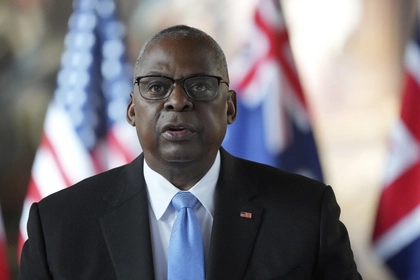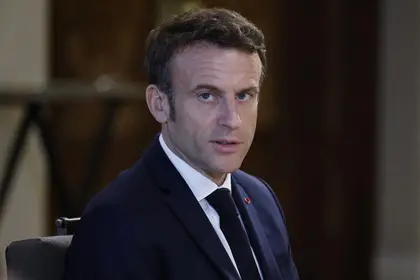On the day President Volodymyr Zelensky traveled to the U.S. – his first foreign trip since Feb. 24 – the Wall Street Journal published an article in which French President Emmanuel Macron called on Europe to reduce its reliance on the U.S. for security.
JOIN US ON TELEGRAM
Follow our coverage of the war on the @Kyivpost_official.
Using a typical ‘Macronism’ “inside NATO, with NATO but also not depending on NATO” – akin to his pet project the European Political Community, which is not a replica of the EU even though similar at its core – the French president described a new initiative which he insists is not an alternative to NATO.
At the same time, the security guarantees under this new architecture, according to Macron, should apply to Ukraine and Russia, as well as Azerbaijan, Georgia, Moldova, and Armenia.
“When I speak of guarantees, I’m talking about all of these countries, for us but also for Russia,” Macron told the WSJ, adding “This means that one of the essential points we must address – as President [Vladimir] Putin has always said – is the fear that NATO comes right up to [Russia’s] doors, and the deployment of weapons that could threaten Russia.”
For one thing, it is puzzling that Macron still uses arguments about NATO’s expansion in the context of preventing further aggression. NATO has been right up to Russia’s doors since 1999.

Pentagon Chief in Kyiv on Solidarity Visit
But of greater concern is that Macron is advocating ideas that directly align with that of the Kremlin’s, which last year demanded that NATO promise not to expand further and discard Ukraine’s potential membership prospect.
The Kremlin spent decades ensuring that Europe and the U.S. scale down their cooperation and pursue their own economic and military strategies, preferably outside of NATO.
Macron’s desire to create a quasi-independent initiative that will inevitably emulate NATO, raises the question of spending and division of responsibilities, potentially leading to a situation where Paris and Berlin, whose behavior in this war, though at times positive, has still been largely questionable, would provide some sort of “security guarantees” to Moscow.
Given that Macron knows that NATO is about to expand into northern Europe, these ‘security guarantees’ sound very much like a promise to not take Ukraine and other former-USSR NATO aspirants into it.
“I probably already said too much.”
A Macron-style initiative like this is not a novel concept. He has been floating the idea of reducing Europe’s security reliance on the U.S. since his first tenure in 2017. And before Putin ordered a full-scale invasion of Ukraine, Macron attempted to fix the situation the ‘Sacre Bleu’ way by having extensive conversations with his Russian counterpart – only to find out that it is impossible to negotiate with a man who has wanted a war all along.
His latest insistence, however, shows that, in spite of the West’s unity in this war, the U.S. and Europe have not fully overcome their divisinos, as noted, among others, by Politico in their article “Europe accuses the US of profiting from war”, citing unnamed senior officials in Brussels.
President Biden’s recent remark in a joint statement with President Zelensky also sheds light on the matter. Answering the question “can we cut a long story short and give Ukraine all capabilities it needs and liberate all territories rather sooner than later?” suggests that the U.S. should give Ukraine not just the long-awaited Patriots, but long-range missiles like ATACMS and more. Biden, unexpectedly, said “yes” before explaining that it is not just a matter decided by the U.S., but the Allies too, hinting at the existing divisions within the Alliance as to the supply of “all capabilities it needs.”
Biden’s statement “the idea that we would give Ukraine material that is fundamentally different than is already going there would have a prospect of breaking up NATO and breaking up the European Union and the rest of the world” only serves to underscore those differences as well as the conclusion that “there’s more to say, but I probably already said too much.”
Though these fractures exist – and most likely will always be there – it is also important to remember that U.S.-Europe relations have been problematic for a long time. The Iraq war, NATO’s insufficient funding, Donald Trump, and the failure of major initiatives like the Transatlantic Trade and Investment Partnership, have been notable causes of tension.
The challenge now, however, is to ensure that these divisions cannot be exploited in the coming years, especially after the 2024 Presidential election in the U.S., with the Trumpists eyeing Capitol Hill once again and plenty of contenders prepared to spend less on security and more on populistic initiatives.
At present, public sentiment in the West remains pro-Ukrainian. Russia, despite numerous attempts to change this, has effectively failed in this respect. But that does not mean that Moscow will not attempt to make a comeback.
Putin’s regime has proved to be resilient, and not much evidence suggests that the Russian public wants to remove him, or revamp Russia’s foreign policy approach of Moscow getting to decide what goes on in its self-defined ‘backyard’.
Macron’s “inside NATO, with NATO but also not depending on NATO” initiative fits very well into this approach – and must be avoided precisely because of that.
The views expressed are the author’s and not necessarily of Kyiv Post.
You can also highlight the text and press Ctrl + Enter






